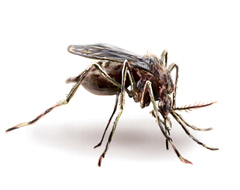Ballots out to property owners to decide fate of mosquito
program
Ballots have gone out to property owners in all of San Benito
County north of Paicines for a vote on a mosquito abatement
program. Property owners have just 45 days to return the mailed
ballots with their votes.
Ballots out to property owners to decide fate of mosquito program
Ballots have gone out to property owners in all of San Benito County north of Paicines for a vote on a mosquito abatement program. Property owners have just 45 days to return the mailed ballots with their votes.
“Three years ago West Nile showed up,” said Paul Matulich, the agricultural commissioner for the county. “We have positive finds, but no human cases reported in San Benito County.”
While many of the surrounding counties, including Monterey, Santa Cruz and Santa Clara have long had mosquito abatement programs in place to focus on prevention efforts, San Benito has not had one.
“We didn’t have the money to start one,” Matulich said. “We got $185,000 [from the state] for equipment and part-time personnel, but those funds have dried up.”
The county received the money as part of emergency grants from the state.
In the meantime, Governor Arnold Schwarzenegger approved a mandate that each county in California must have a mosquito abatement program – and the state will not provide funding for it. Over two years of planning, the agricultural commissioner’s office, the Health and Human Services Agency and the Board of Supervisors have been working together to decide the best way to implement and fund a program.
“The general fund is the least available [fund] in the county budget,” said Susan Thompson, the county administrative officer. “When it is the least available, it is pulled in many directions.”
Much of the general fund is used for law enforcement services and there is little left over for other programs.
“The county has very limited general funds available,” said Anthony Botelho, a county supervisor who served on a taskforce that looked at mosquito abatement options.
Thompson agreed.
“We would have to find a way to fund it and that would have to be through cutbacks,” Thompson said.
One option for funding a mosquito abatement program that would not require county budget cuts is a special assessment district – which is what most other counties in California use to fund their programs.
“If it is a high priority [program] like this, it is the best way to make sure the state can’t touch the money or make you use it for something else,” Thompson said.
Special assessment district funds must stay in the county and be used only for very specific purposes as outlined in the ballot that will be received by property owners.
The ballot was mailed out May 8. Voters have 45 days to return the ballots. The assessment would be $9.80 a year on most residential properties.
One of the protections for property owners is that the assessment cannot be raised unless it is brought back to the voters with a mailed ballot, Matulich said. The Board of Supervisors can, however, lower the assessment if the money collected each year is more than is needed for the services.
“Nothing changes – nothing can change unless [the property owners] want it to change,” Thompson said. “The people are driving their own bus.”
The money would be used for prevention measures, such as monitoring mosquito populations in the county, treating mosquito pools with larvicide so that the larvae do not become adults and educating residents about how to eliminate infestations.
The best way to stop the spread of diseases by mosquitoes is prevention, Matulich said.
Tracking the county for larvae pools and educating residents about what to do about mosquitoes is a key part of the assessment program.
“It takes a week or less for larvae to become adults,” Matulich said. “They can travel up to half a mile and that affects neighbors and surrounding areas.”
“It’s an ongoing need,” Thompson said. “It’s not something that is once and then we are done. It’s something we need to continue.”
In initial surveys conducted by the SCI Consulting Group, a consultant firm hired by the county, 60 percent of property owners north of Paicines favored an assessment district. Within the boundaries of the proposed assessment district, 95 percent of the county population is included.
While West Nile Virus has been the impetus for starting mosquito abatement programs statewide, there are other reasons to worry about the bugs.
“Mosquitoes are carriers of other diseases,” said Kathy Flores, director of the Health and Human Services Agency. “They are the biggest vector on the planet.”
Other illnesses they can carry include malaria, dengue fever, yellow fever and encephalitis.









